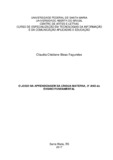| dc.contributor.advisor | Cordenonzi, Walkiria Helena | |
| dc.creator | Fagundes, Claudia Cristiane Bisso | |
| dc.date.accessioned | 2018-11-29T12:39:19Z | |
| dc.date.available | 2018-11-29T12:39:19Z | |
| dc.date.issued | 2017-06-24 | |
| dc.date.submitted | 2017 | |
| dc.identifier.uri | http://repositorio.ufsm.br/handle/1/14978 | |
| dc.description | Artigo (especialização) - Universidade Federal de Santa Maria, Centro de Artes e Letras, Curso de Especialização em Tecnologias da Informação e Comunicação Aplicadas à Educação, EaD, RS, 2017. | por |
| dc.description.abstract | Learning Portuguese as a mother tongue is presented as a fundamental subject in alphabetization
inside the school, and it must be learnt by every child, which does not mean that this is an easy task,
considering that it is one of the most difficult languages due to the fact that it contains many norms and
specificities. The proposition of this research is to develop the correct writing of words through the use
of educational software as a means to facilitate the learning of the substantive classification of words.
For this purpose, exercises for the verification of knowledge related to substantive classification have
been applied before and after using the game, in order to quantify the improvement -or its lack thereofin
the learning process, besides the observation of the work performed by the students during the
procedures. After analyzing the obtained data, a meaningful improvement in learning has been perceived
in most students concerning substantive classification after playing the game, and a greater
understanding of classification, the to the fact that the game allowed the student to think and reflect
about his or her answers and to try again in case he or she failed. During the game it has been observed
that the students interacted and shared knowledge, clarified doubts among themselves and
had fun playing and learning, which they readily confirmed when questioned. Finally, thanks to this
study, it became very clear that using games to aid the learning process can bring students closer to
the construction of their own knowledge, because it is an element that belongs to the universe of the
child, it is dynamic and does not provide a ready answer, but it makes children think. | eng |
| dc.language | por | por |
| dc.publisher | Universidade Federal de Santa Maria | por |
| dc.rights | Acesso Aberto | por |
| dc.rights | Attribution-NonCommercial-NoDerivatives 4.0 International | * |
| dc.rights.uri | http://creativecommons.org/licenses/by-nc-nd/4.0/ | * |
| dc.subject | Língua materna | por |
| dc.subject | Software educacional | por |
| dc.subject | Classificação substantiva | por |
| dc.subject | Mother tongue | eng |
| dc.subject | Educational software | eng |
| dc.subject | Substantive classification | eng |
| dc.title | O jogo na aprendizagem da língua materna, 5º ano do ensino fundamental | por |
| dc.title.alternative | Games in the aquisition of the mother tongue, 5th years of elementary school | eng |
| dc.type | Trabalho de Conclusão de Curso de Especialização | por |
| dc.degree.local | Polo de Santana do Livramento, RS, Brasil | por |
| dc.degree.specialization | Tecnologias da Informação e Comunicação Aplicadas à Educação, EaD | por |
| dc.description.resumo | A aprendizagem da língua materna, ou seja, o Português se apresenta como matéria fundamental de
alfabetização dentro da escola e deve ser aprendida por todas as crianças, não quer dizer que seja
uma tarefa fácil, pois é um dos idiomas mais difíceis por conter muitas normas e especificidades. A
proposta desta pesquisa é desenvolver a escrita correta das palavras através do uso de um software
educacional para aprendizagem da classificação substantiva das palavras. Para tanto foi utilizado
exercícios de verificação de conhecimento de classificação substantiva antes do uso do jogo e depois,
para quantificação da melhora ou não da aprendizagem, além de observação do trabalho realizado
pelos alunos durante os procedimentos. Após análise dos dados obtidos foi percebido uma melhora
significativa da aprendizagem por parte dos alunos na classificação substantiva, posteriormente
ao uso do jogo, e um maior entendimento da classificação, pois o jogo permitia que o aluno pudesse
pensar e refletir sobre a resposta e tentar novamente se errasse, durante o uso do jogo foi observado
que os alunos interagiram e dividiram conhecimento, tiraram dúvidas entre si e se divertiram brincando
e aprendendo, o que foi confirmado por eles quando questionados. Por fim do estudo ficou muito
claro que o uso de jogos na aprendizagem pode aproximar os alunos da construção do seu próprio
conhecimento, porque é do universo infantil, é dinâmico e não da resposta pronta, mas faz pensar. | por |
| dc.publisher.country | Brasil | por |
| dc.publisher.initials | UFSM | por |
| dc.subject.cnpq | CNPQ::CIENCIAS HUMANAS::EDUCACAO | por |
| dc.publisher.unidade | Centro de Artes e Letras | por |



